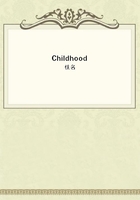
第28章
When the Princess had heard my verses and overwhelmed the writer of them with praise, Grandmamma softened to her a little. She began to address her in French and to cease calling her "my dear." Likewise she invited her to return that evening with her children. This invitation having been accepted, the Princess took her leave. After that, so many other callers came to congratulate Grandmamma that the courtyard was crowded all day long with carriages.
"Good morning, my dear cousin," was the greeting of one guest in particular as he entered the room and kissed Grandmamma's hand, He was a man of seventy, with a stately figure clad in a military uniform and adorned with large epaulettes, an embroidered collar, and a white cross round the neck. His face, with its quiet and open expression, as well as the simplicity and ease of his manners, greatly pleased me, for, in spite of the thin half-circle of hair which was all that was now left to him, and the want of teeth disclosed by the set of his upper lip, his face was a remarkably handsome one.
Thanks to his fine character, handsome exterior, remarkable valour, influential relatives, and, above all, good fortune, Prince, Ivan Ivanovitch had early made himself a career. As that career progressed, his ambition had met with a success which left nothing more to be sought for in that direction. From his earliest youth upward he had prepared himself to fill the exalted station in the world to which fate actually called him later; wherefore, although in his prosperous life (as in the lives of all) there had been failures, misfortunes, and cares, he had never lost his quietness of character, his elevated tone of thought, or his peculiarly moral, religious bent of mind.
Consequently, though he had won the universal esteem of his fellows, he had done so less through his important position than through his perseverance and integrity. While not of specially distinguished intellect, the eminence of his station (whence he could afford to look down upon all petty questions) had caused him to adopt high points of view. Though in reality he was kind and sympathetic, in manner he appeared cold and haughty--probably for the reason that he had forever to be on his guard against the endless claims and petitions of people who wished to profit through his influence. Yet even then his coldness was mitigated by the polite condescension of a man well accustomed to move in the highest circles of society. Well-educated, his culture was that of a youth of the end of the last century. He had read everything, whether philosophy or belles lettres, which that age had produced in France, and loved to quote from Racine, Corneille, Boileau, Moliere, Montaigne, and Fenelon. Likewise he had gleaned much history from Segur, and much of the old classics from French translations of them; but for mathematics, natural philosophy, or contemporary literature he cared nothing whatever.
However, he knew how to be silent in conversation, as well as when to make general remarks on authors whom he had never read--such as Goethe, Schiller, and Byron. Moreover, despite his exclusively French education, he was simple in speech and hated originality (which he called the mark of an untutored nature).
Wherever he lived, society was a necessity to him, and, both in Moscow and the country he had his reception days, on which practically "all the town" called upon him. An introduction from him was a passport to every drawing-room; few young and pretty ladies in society objected to offering him their rosy cheeks for a paternal salute; and people even in the highest positions felt flattered by invitations to his parties.